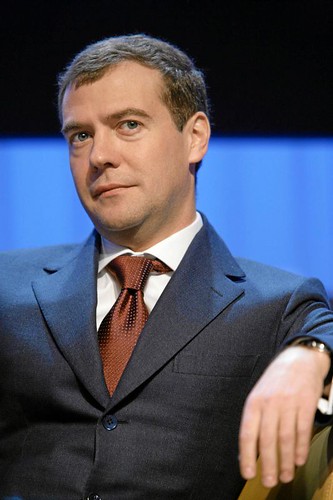Well, it seems as if Russian President Vladimir Putin is finally off the job market. His recent decision to lead the United Russia Party in upcoming elections likely means that after leaving the Kremlin in 2008 he will take up the post of prime minister. Rumors about his future employment have swirled since he mischievously announced that he would not alter the constitution to serve a third term as president but would still somehow wield power in the future.
The president, by refusing to tinker with the constitution, wants to deflect potential Western criticism, which would liken him to other leaders who have bent the electoral rules to stay in power—i.e. Hugo Chavez. But because of the constitutional promise, conventional wisdom was that Putin would take a lower level position and wait for 2012 to re-take the Kremlin.
Indeed, the Russian Premier has been linked to numerous positions, including the following: CEO of Gazprom, the state-owned energy giant; National Security Advisor; President, amending the constitution and staying on for another term; and some that have yet to be created.
The mystery surrounding Putin’s successor is thrown another twist. Many analysts foresaw Putin naming a prime minister shortly before the election, who would then become president in 2008—a similar route that Putin took to the Kremlin in 1999. The Russian President, however, turned the race upside down when he named unheralded Victor Zubkov, a former Soviet State Farm Director and Putin crony from his days in St. Petersburg, as prime minister a few weeks ago.
Something was up. Yet no one could tell for sure. Now, perhaps we know. Sergei Ivanov and Dmitry Medvedev, Defense Minister and Deputy Prime Minister respectively, were long considered the frontrunners. These men seem the most likeable. Yet neither is able to become president without the endorsement of Putin, whose ratings are in the 70s. Their potential popularity may turn out to be their downfall, as Putin does not want a rival in the Kremlin.
Instead, he wants a loyalist. Zubkov must now be considered the favorite for the presidency, and will play a primary role in Putin's grand scheme. With the appointment of this relatively unknown, weak bureaucrat, Putin seeks to install a caretaker president who will not pose a threat and gladly relinquish the Kremlin keys to him in 2012.
In the meantime, Putin still needs to maintain his grip on power. The office of Prime Minister, as the current constitution dictates, is not much more than a figure head—the real influence lies in the Kremlin. As such, Putin will likely reform the constitution to grant more authority to the Prime Minister, and if the United Russia Party garners a 2/3 majority in the elections—as it might, given the president’s popularity—he will have the votes to do so.
This would produce another conundrum: what is Putin to do in 2012 when he resumes a presidency which has been weakened by his own reforms? It is unlikely that the constitution would be revised again. He might have to cross that bridge when he comes to it.
Here’s another possibility: Putin’s personality and popular approval is so overwhelming that he eschews institutional reform, and instead, simply pulls the reins of power from the prime minister’s office. Zubkov would not dare deny his ally. Backroom deals would be the norm: President Zubkov would merely read Prime Minister Putin’s marching orders.
On the other hand, Putin might not have the patience to wait until 2012. The constitution simply states that the limit is two consecutive terms. If his successor steps down shortly after gaining the presidency, Putin could technically reoccupy the Kremlin in accordance with the constitution.
As shown time and time again, the Russian premier is unpredictable. The ambiguity surrounding his future and that of his successor only serves to validate this point. Yet the likely scenario is Zubkov and Putin switching roles in 2008, resulting in another Putin presidency in 2012. What happens between 2008 and 2012 is up in the air. Yet, who will wield the true power in Russia for the foreseeable future is not.
Subscribe to:
Post Comments (Atom)





No comments:
Post a Comment